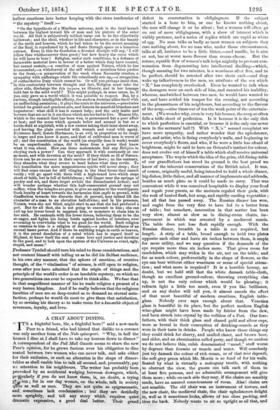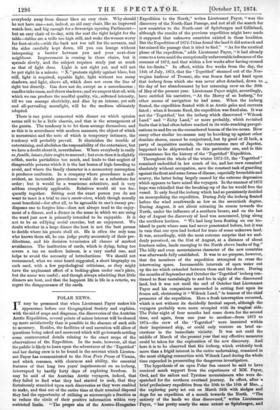A CHAT ABOUT DINING.
" IT'S a frightful bore, Sir, a frightful bore !" said a new-made Peer to a friend, who had hinted that dislike to a coronet was only another form of the Nolo episcopari. "Why, in half the houses I dine at I shall have to take my hostess down to dinner." A correspondent of the Pall Mall Gazette seems to share the new " Peer's opinion, for he grows furious over his obligation to dine seated between two women who can never talk, and asks either for their exclusion, or such an alteration in the shape of dinner- tables as shall enable him to talk all around, and, presumably, pay n1 attention to his neighbours. The writer has probably been provoked by an accidental wedging between dowagers, which, pr Ocularly if you do not know them, is, no doubt, a trying
Aon ; for in our day women, on the whole, talk in society q ite as well as men. They are not quite so epigrammatic, and sometimes lack condensation ; but they are decidedly more sprightly, and tell any story which requires quiet dramatic expression, a good deal better. Their grand
defect in conversation is obligingness. If the subject started is a bore to him, or one he knows nothing about, the man will change it or be silent ; but a woman will often go on out of mere obligingness, with a show of interest which is visibly pretence, and a series of replies which are vapid as white of egg. No man talks as badly as most women on subjects they care nothing about, for no man who, under those circumstances, talks at all, hesitates to be a little bitter,—and vanille, be it nice or not, has at worst more flavour than cream-cheese. But the serene, equable flow of women's talk helps mightily to prevent con- versation from degenerating into intellectual duelling—which, though amusing for two minutes, is a weariness after five, and to be perfect, should be arrested after two shots each—and they wake up 'talkativeness in the men, an attribute of the sex which " X." has completely overlooked. Even he wanted to talk when the dowagers were on each side of him, and resented his inability, whereas, sandwiched between two men, he would have wanted to eat, and have settled his temper for the evening, not according to the pleasantness of his neighbours, but according to the flavour of the soup,—nine times out of ten the weak point of the entertain- ment. (We wonder why, even in very fair houses, the soup so often falls a trifle short of perfection. Is it because it is the only dish to which perfection is essential, or because it is the only one never seen in the servants' hall ?) With " X.'s " second complaint we have more sympathy, and rather wonder that the upholsterer, poet, and artist, who is lining everybody's walls, and beginning to cover everybody's floors, and who, if he were a little less afraid of brightness, might be said to have an Oriental's instinct for colour, does not evolve out of himself a table which shall receive universal acceptance. The wayin which the idea of the grim, old dining-table of our grandfathers has stood its ground is the best proof we know of the inherent conservatism of the British mind. It was, of course, originally useful, being intended to hold a whole dinner, big dishes, little dishes, and, all manner of implements and addenda, besides as much plate as it could be made to carry. That was convenient while it was conceived hospitable to display your food and regale your guests, as the ancients regaled their gods, with the reek of heated flesh, hot soup, and rapidly-cooling vegetables ; but all that has passed away. The Russian dinner has won, and ought from the very first to have led to a better form of table ; but somehow, innovation in that matter has been very slow, almost as slow as in dining-room chairs, im- provement in which was arrested by a mediaeval mania. The table does not lose flesh rapidly enough. With the, Russian dinner, breadth in a table is not required,, but length. A strip of a table, broad enough to hold two plates opposite each other and leave six inches between them, is ample, for mere utility, and we may question if the demands of the eye require more than six inches more. That gives room for candelabra, which may widen in the air, not on the table; and for as much colour, preferentially in the shape of flowers, as the eye can hew without either weariness or sense of special attrac- tion • and what more is required? It is a horrible heresy, no doubt, but we hold still that the white damask table-cloth, though an excellent ground-colour, throwing everything else up, is not the only colour which would be pleasing ; it refracts light a little too much, even if you like brilliance, and as any dealer will tell you, -it almost annuls the effect of that most beautiful of modern creations, English table- glass. Nobody ever says enough about that. Venetian glass is beautiful in its place, but the perfect modern English wine-glass might have been made by fairies from the dew, and been struck into crystal by the volition of a Peri. Our fore- fathers, with their thick glass and chased gold and silver cups, were as brutal in their conception of drinking-vessels as they were in their taste in drinks. People who know those things say they could drink hot sherry, and mulled claret, and brown beer, and cider, and an abomination called perry, and though we confess we do not believe this, culsh denominated "mead," stuff worse by degrees than koumiss or treacle and water. Will somebody just try damask the colour of rich cream, or of that feint degrade, the soft grey green which Mr. Morris is so fond of for his walls. Seated by what is virtually a mahogany trestle, with nothing to obstruct the view, the guests can talk each of them to at least five persons, and no admissible arrangement will give them more ; while on each side they may, if the chairs are sensibly made, have an assured consciousness of room. Alas ! chairs are not sensible. The old chair was an instrument of torture, and the new chair, the medimval chair, the chair upholsterers delight in, well as it sometimes looks, allows of too close packing, and tires the back. Nobody wants to sit so upright as all that, and
everybody away from dinner likes an easy chair. Why should he not have one—not, indeed, an old easy chair, like an improved watch-box, and big enough for a Sovereign opening Parliament— but an easy chair of to-day, with the seat the right height for the table—tables are a trifle too high still, and make the women worry for foot-stools—with the back not too tall for the servants, and the sides carefully kept down, till you can lounge without interposing a barrier between you and, your next-door neighbour. Improvement is coming in those chairs, but it spreads slowly, and the subject requires study just as much as that of light does. Light is not right yet, and will not be put right in a minute. "X." protests rightly against blaze, but still, light is required, equable light, light without too many shadows, and light, above all, which does not cross the line of sight too directly. Gas does not do, except as a succedaneum ; candles take room, and throw shadows; and we suspect that oil, with which we can produce the needful quality, viz., softened intensity, till we can manage electricity, and dine by an intense, yet soft and all-pervading moonlight, will be the medium ultimately adopted.
There is one point connected with dinner on which opinion seems still to be a little chaotic, and that is the arrangement of the guests. The tendency is to let them arrange themselves, and as this is in accordance with modern manners, the object of which is =restraint and the note of which is temporary intimacy, the tendency will probably prevail. It diminishes the trouble of entertaining, and abolishes the responsibility of the entertainer, but we have a doubt about it, nevertheless. Where everybody is really en familk, laissez-faire ought to succeed ; but even then it is slightly selfish, marks partialities too much, and leads to that neglect of disagreeable persons which it is the last lesson of high-breeding to avoid, and where the family character is a momentary assumption it produces confusion. In a company where precedence is self- evident, an inexorable precedence would do as a substitute for order ; but it would be a wearisome substitute, and is very seldom completely applicable. Relatives would sit too fre- quently together. Sitting next the exact person you do not want to meet is a trial to one's savoir-vivre, which though morally most beneficial—for after all, to be agreeable to one's enemy pre- disposes one to forgive him—does not always tend to the enjoy- ment of a dinner, and a dinner in the sense in which we are using the word just now is primarily intended to be enjoyable. It is not to be an edifying social exercise, but an enjoyment. We doubt whether in a large dinner the host is not the best person to decide where his guests shall sit. He is often the only man who knows them all, he can judge pretty accurately of their pre- dilections, and his decision terminates all chance of marked avoidances. The institution of cards, which is dying, being too severe a tax on modern laziness, is a very useful one, and helps to avoid the necessity of introductions. We should not recommend, what we once heard suggested, a short biography on each card, with a few psychological criticisms, as they might have the unpleasant effect of a looking-glass under one's plate, but the name was useful ; and though always admitting that little dinners are best, and that the happiest life is life in a coterie, we regret the disappearance of the cards.



































 Previous page
Previous page